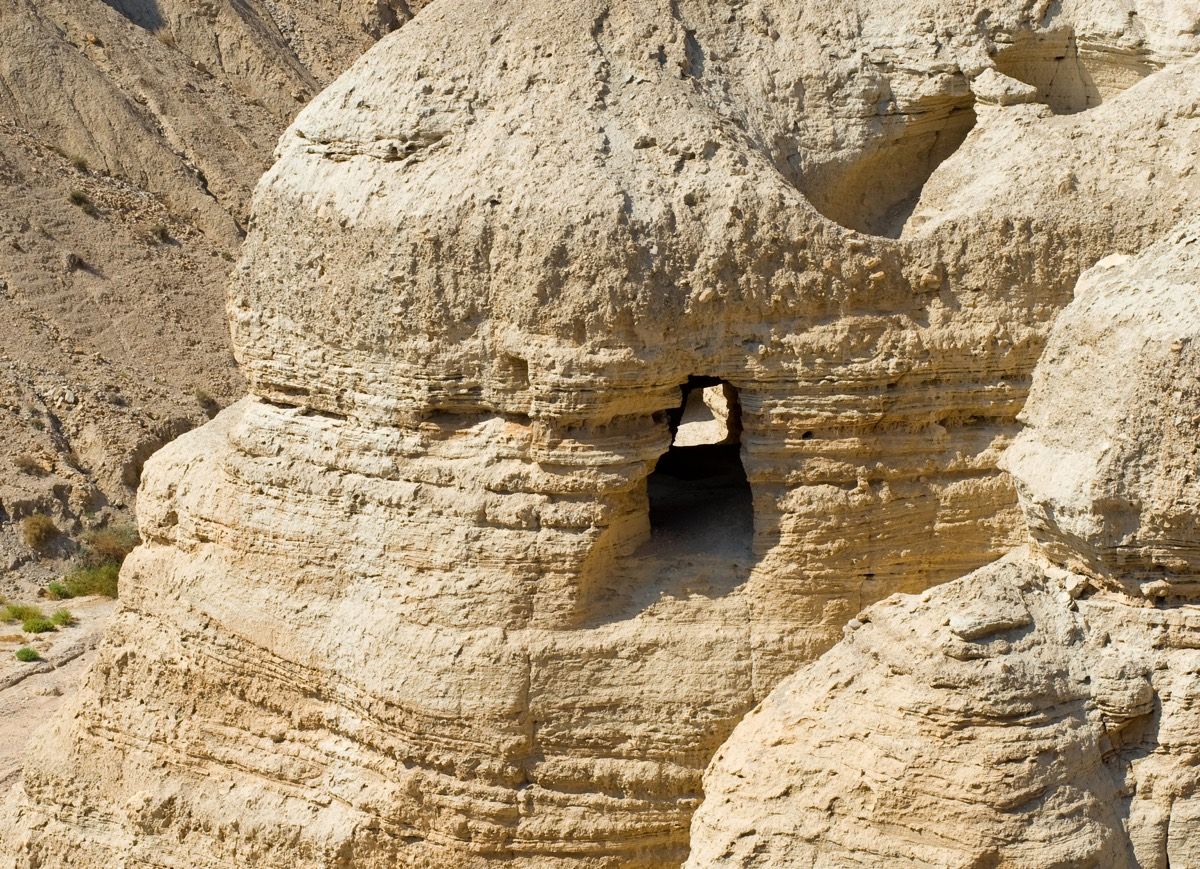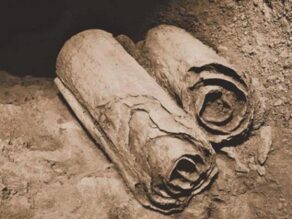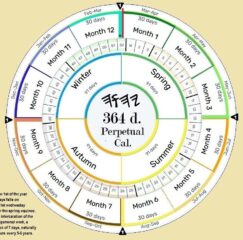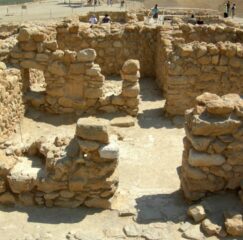His Calendar
Keeping His Appointed Times
The Greatest Revelation of Our Day...To Date

Qumran - A Perspective on Archeology
For thousands of years, it just wasn't important. That single phrase pretty well sums it up. Archeology may have well been rocket science, for it seems that it has only been of concern over the past 200-300 years. for a millennia before that, what could have been discerned and known of the life and times from that of patriarchs to the apostles was carefully gathered by and into the vast recesses of the Vatican - as though they owned it - or wished it not to be known. Then, in the late 1700's to the late 1800's the scientific and religious communities appeared to awaken from its slumber and take an interest in the historic and intellectual treasures all around them. But try as they might to make up for lost time, it took a shepherd boy and a stone to uncover the greatest archeological find of all times. The caves of Qumran.
Why is Qumran Important?
As children, we all played a game we called 'telegraph'. One child would conceive a message and whisper it in the ear of his neighbor in a circle. That child would try to remember or reconstruct it and pass it to the next. Finally, the last child would state it out load - oftentimes radically different than it was first conceived.
Now, imagine if that message was also passed through a series of foreign languages, complete with translation interpretations, various contextual adjustments and over thousands of years and hundreds and hundreds of messengers. That is what we have with the Scriptures - and it is only by the grace of the Almighty, and the outpouring of His Spirit that we have anything close to the original message. What Qumran represents is the uncovering of an almost complete library of the First Days Scriptures that are nearly 1000 years OLDER than any other available manuscript.
Who Left the Scrolls at Qumran to be Found?
Having read the entirety of the documents on at least two occasions, I am of the conviction that this library was the bequest of the descendants of the Zadok Division of the Line of Aaron. All evidence points to the resource of this community being only able to support a Yahad (community) of not more than 150 persons. There is no evidence of anything but a male population, who strictly kept the commandments, encouraged the walk of divisions scattered throughout Ishra'el and live a life that was extraordinarily reminiscent of Ezekiel 44:
15 “But the priests, the Lĕwites, the sons of Tsaḏoq, who guarded the duty of My set-apart place when the children of Yisra’ĕl went astray from Me, they shall draw near to Me to serve Me and shall stand before Me to bring to Me the fat and the blood,” declares the Master יהוה.
16 “They shall enter My set-apart place, and they shall draw near to My table to serve Me, and they shall guard My charge.
17 “And it shall be, when they enter the gates of the inner courtyard, that they put on linen garments, and no wool shall come upon them while they attend within the gates of the inner courtyard or within the house.
18 “They shall have linen turbans on their heads and linen trousers on their bodies, they shall not gird themselves with sweat.
19 “And when they go out to the outer courtyard, to the outer courtyard to the people, they shall take off their garments in which they have attended and shall leave them in the set-apart rooms, and shall put on other garments, and they shall set-apart the people in their garments.
20 “And their heads they shall not shave, nor shall they let their hair grow long – they shall keep their hair well-trimmed.
21 “And no priest is to drink wine when he comes into the inner court.
22 “And they do not take as wife a widow or a divorced woman but take maidens of the seed of the house of Yisra’ĕl, or widows of priests.
23 “And they are to teach My people the difference between the set-apart and the profane and make them know what is unclean and clean.
24 “And they are to stand as judges in a dispute and judge it according to My right-rulings. And they are to guard My Torot and My laws in all My appointed times and set apart My Sabbaths.
25 “And they are not to defile themselves by coming near a dead man. Only for a father or mother, for a son or daughter, for a brother or unmarried sister they defile themselves.
26 “And after his cleansing, they count seven days for him,
27 and on the day that he comes into the inner court of the set-apart place to attend in the set-apart place, he brings his sin offering,” declares the Master יהוה.
28 “And it shall be to them for an inheritance, I am their inheritance. And you give them no possession in Yisra’ĕl – I am their possession.
This passage shall soon become a post, detailing how this passage became the Rule of Their Community.
The Contents of the Library at Qumran

What Has Been Gleaned from the Eleven Caves?
A series of quotes from "The Dead Sea Scrolls' A New Translation" by Michael Wise, Martin Abegg & Edward Cook:
'The total number of scrolls, when all books were intact, may have been as high as 1000. Some have vanished without a trace (due to material degradation), but scholars have identified the remains of about 870 separate scrolls. Their long centuries in the earth have reduced the vast majority to bits and pieces, mere scraps, some no larger than a fingernail.' p. 5
'In short, there are good - indeed, overwhelming - reasons to locate those who wrote and copied the Dead Sea Scrolls in the Israel period ca. 200 B.C.E to 100 C.E..' p. 15
These scrolls include a canon of the entire First Days Scriptures (Old Testament) except for the Book of Esther, and there are multiple copies of foundational books like Enoch, Genesis, Jubilees, Isaiah and other of the prophets. There are also numerous scrolls that very practically detail the workings of the Calendars described in Enoch and Jubilees. It is this subject that brings this page and the related posts on the subject into existence.
A particular note of thanks:
Much of what I have come to understand and cling to as my own opinion of the YAH's Calendar is due to some brilliant compilation work at the site, Qumran Calendar, the True Calendar of YHWH. I can heartily recommend downloading and making regular reference to their Google Calendar found here. You will find below and in my posts that in many cases I quote her words exactly as they are found on her site's pages, that for some reason have never been completed and I have not been able to receive any response from the site's author.
Posts About the Calendar
The calendar of Hanock (Enoch), having been passed down from him to Methusaleh, then to Noach (Noah), to Shem, Abraham, Yitzaq, Ya'aqob and finally to Levi was carefully preserved by those who stayed faithful to YAHUAH throughout the generations. Ezra was part of this clan and ensured that the scriptural library was complete.
More on the Qumran Community
The community at this location is was not the entirety of the faithful remnant. Nor was their existence in a vacuum. I am of the firm opinion that John the Immerser spent much of his early year within this community, and that Messiah - when He went into the 'Wilderness' to pray, often found his way here. It was these 'priests' who believed. (Acts 2)


